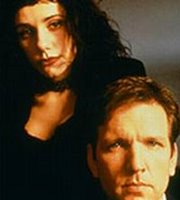 One of my favourite films about Jesus is Hal Hartley's 1998 film Book of Life. It's not really a film about the life of Jesus per se. so I could only include it in my top ten list of Jesus films as an honourable mention. But it does ask some interesting questions about Jesus, his relationship with God, eschatology, Christianity and so forth.
One of my favourite films about Jesus is Hal Hartley's 1998 film Book of Life. It's not really a film about the life of Jesus per se. so I could only include it in my top ten list of Jesus films as an honourable mention. But it does ask some interesting questions about Jesus, his relationship with God, eschatology, Christianity and so forth. Recently I found the Philosophical Films website, and it has the following brief review for the film and a series of questions.
Jesus returns December 31, 1999 at JFK airport in New York City and checks into a Manhattan hotel. His task is to end the world as we currently know it, judge the wicked, and begin the new Millennium of God’s rule. To do this, he must open the last three seals of the Book of Life, which will bring on the remainder of the apocalypse. But, Jesus is having second thoughts and considering forgiving everyone instead. This means defying God and in essence exiling himself from God just as Satan did. As Jesus struggles with his decision, he locks horns with God’s attorney on earth who insists that Jesus follow God’s law. Meanwhile, Satan likes things just as they are and laments the opening of the Book of Life. When he discovers Jesus' hesitation, he acquires the Book of Life in an attempt to open just one more seal on it. Unfortunately for Satan, the Book of Life has a security lock on it that he can’t undo. "Those bastards in heaven, they think of everything," Satan whines. Satan then joins Jesus at his hotel for a New Year’s Eve party, and the new millennium begins just like any normal day.
 It's difficult in such a brief review to really do a film like this justice, although the 14 questions that follow deal effectively with many of the philosophical aspects of the film. It doesn't have that much to say about the astounding closing monologue which is done as a voiceover whilst the images switch from those of the New Year's Eve party to Jesus pondering these issues as he looks out to sea. The visual aspects of this film are very noticeable as well. The camera work is quirky, using different angles, blurs, slow motion etc. Elsewhere, the actors break the "fourth wall", and talk directly to the camera. Director Hal Hartley thoughtfully even provides a microphone to enable them to do this. So, as with other Hartley films, the film is as much about the formal aspects of filmmaking as it is about the philosophical issues the characters are raising.
It's difficult in such a brief review to really do a film like this justice, although the 14 questions that follow deal effectively with many of the philosophical aspects of the film. It doesn't have that much to say about the astounding closing monologue which is done as a voiceover whilst the images switch from those of the New Year's Eve party to Jesus pondering these issues as he looks out to sea. The visual aspects of this film are very noticeable as well. The camera work is quirky, using different angles, blurs, slow motion etc. Elsewhere, the actors break the "fourth wall", and talk directly to the camera. Director Hal Hartley thoughtfully even provides a microphone to enable them to do this. So, as with other Hartley films, the film is as much about the formal aspects of filmmaking as it is about the philosophical issues the characters are raising.Whilst I'm at it, another brief review of this film appears in a summary of 1998's Vancouver International Film Festival at Canadian Christianity.com.
No comments:
Post a Comment
Spammers - don't bother! Anything perceived as spam will be deleted. Save us both a bit of time and go somewhere else.